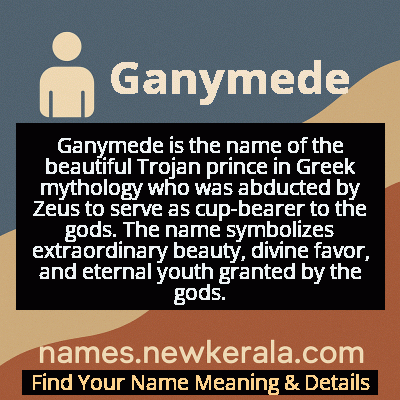Ganymede Name Meaning & Details
Origin, Popularity, Numerology Analysis & Name Meaning of Ganymede
Discover the origin, meaning, and cultural significance of the name GANYMEDE. Delve into its historical roots and explore the lasting impact it has had on communities and traditions.
Name
Ganymede
Gender
Male
Origin
Greek
Lucky Number
2
Meaning of the Name - Ganymede
Ganymede is the name of the beautiful Trojan prince in Greek mythology who was abducted by Zeus to serve as cup-bearer to the gods. The name symbolizes extraordinary beauty, divine favor, and eternal youth granted by the gods.
Ganymede - Complete Numerology Analysis
Your Numerology Number
Based on Pythagorean Numerology System
Ruling Planet
Moon
Positive Nature
Diplomatic, friendly, artistic, empathetic.
Negative Traits
Over-sensitive, moody, indecisive, prone to self-pity.
Lucky Colours
Green, cream, white.
Lucky Days
Monday.
Lucky Stones
Pearl, moonstone.
Harmony Numbers
1, 3, 4.
Best Suited Professions
Diplomats, mediators, caregivers, artists.
What People Like About You
Cooperative spirit, friendliness, artistic talent.
Famous People Named Ganymede
Ganymede (Mythological)
Divine Cup-Bearer
Abducted by Zeus to serve as cup-bearer to the gods on Mount Olympus, granted immortality and eternal youth
Ganymede (Astronomical)
Celestial Body
Largest moon of Jupiter and in the Solar System, discovered by Galileo Galilei, named after the mythological figure
Ganymede (Literary)
Shakespearean Character
Appears in Shakespeare's 'As You Like It' as a shepherdess, though gender-swapped from the original myth
Name Variations & International Equivalents
Click on blue names to explore their detailed meanings. Gray names with will be available soon.
Cultural & Historical Significance
Ganymede's elevation to Olympus and grant of eternal youth made him a symbol of transcendence and divine favor that has resonated across Western art, literature, and philosophy for millennia. His story reflects ancient Greek attitudes toward pederasty, divine intervention, and the boundaries between mortal and immortal realms. The mythological narrative has been depicted in countless artworks from ancient pottery to Renaissance paintings by masters like Correggio and Rembrandt, each era interpreting the story through its own cultural lens and values.
Extended Personality Analysis
Individuals named Ganymede are often perceived as possessing exceptional beauty, grace, and charm that draws others to them naturally. They tend to be charismatic figures who excel in social situations, much like their mythological counterpart who served the gods with elegance and poise. These individuals often display a refined aesthetic sense and appreciation for beauty in all forms, along with a diplomatic nature that allows them to navigate complex social dynamics with ease.
There's frequently an air of mystery or otherworldliness about them, as if they possess insights or perspectives beyond the ordinary. They may demonstrate loyalty and service-oriented qualities, yet maintain a certain independence and self-possession that makes them compelling figures in any social circle. Their combination of physical appeal, social grace, and intellectual depth often positions them as natural leaders or influential figures in their communities, though they may prefer roles that allow them to serve from behind the scenes rather than seeking overt power.
Modern Usage & Popularity
In contemporary times, Ganymede remains an exceptionally rare given name, primarily used by parents seeking distinctive mythological names with classical gravitas. Its usage is almost exclusively limited to academic families, mythology enthusiasts, or those with particular interest in astronomy and space exploration. The name has never appeared in popular baby name rankings and maintains an avant-garde status, with recent interest in unique mythological names and the growing visibility of Jupiter's moon in space exploration news creating slight increases in consideration, though actual usage remains minimal. It's predominantly used in English-speaking countries and Western Europe, often chosen for its combination of mythological weight, astronomical connection, and distinctive sound that sets it apart from more common classical names.
Symbolic & Spiritual Meanings
Ganymede symbolizes the intersection of mortal beauty and divine favor, representing the human capacity for transcendence and elevation to higher states of being. Metaphorically, he embodies the ideal of service combined with dignity, where even the most humble role can be performed with such grace that it becomes divine. The eagle's abduction symbolizes the sudden, transformative moments that can elevate ordinary existence to extraordinary heights, while his eternal youth represents humanity's perpetual quest for immortality through legacy and cultural memory. His story serves as a complex symbol of the relationships between power and beauty, privilege and service, mortality and divinity - making him one of mythology's most richly symbolic figures whose meanings continue to evolve with changing cultural contexts and interpretations.

